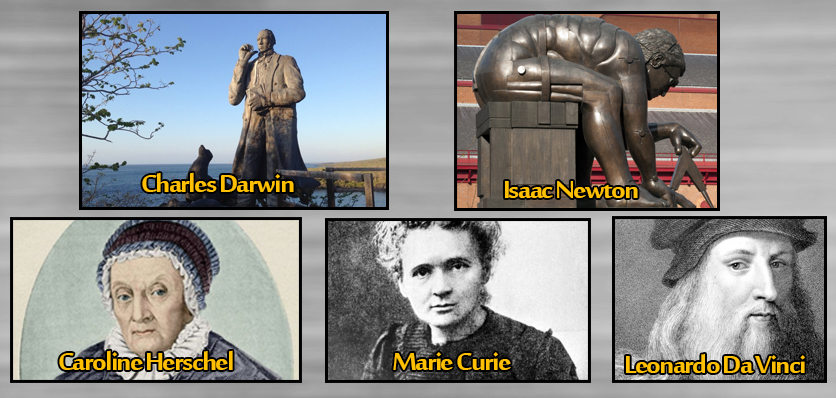
Thomas Edison famously declared genius to be “one percent inspiration and ninety-percent perspiration.” And it’s true: Even the world’s most celebrated minds didn’t have easy or obvious paths. The fact is that no matter how smart you are, true success requires many things, including hard work and perseverance. Let’s take a closer look at five famous scientists who set inspiring examples during their lifetimes.
1. Writer’s Block: Charles Darwin
Charles Darwin took a staggering 17 years to pen his magnus opus, “On the Origin of Species.” One thing that helped him stay the course during that time span? He established and stuck to a routine. While he set plenty of time aside for writing, he also designated time for other pursuits -- including exercise, spending time with his family and dog, and gardening. In fact, according to an article on Darwin’s schedule in The Guardian, Darwin put “domestic comfort” above all else while writing.
Another thing that kept Darwin on track? An emotional connection with his subject matter. He once said, “It is interesting to contemplate an entangled bank, clothed with many plants of many kinds. With birds singing on the bushes, with various insects flitting about, and with worms crawling through the damp earth, and to reflect that these elaborately constructed forms, so different from each other, and dependent on each other in so complex a manner, have all been produced by laws acting around us.”
Your takeaway? Writing at a breakneck pace may not be as fruitful as you think. Darwin himself described the writing process as “very hard and slowly at every sentence,” but by prioritizing his personal life and maintaining a realistic schedule, he ended up writing the seminal book on evolution.
2. Applying a Theory: Isaac Newton
Isaac Newton is among the 17th century’s most influential scientists, and his groundbreaking work is now the foundation for modern physics. Many experts posit that his true genius lay not in the theories themselves, but in how Newton applied them to the universe at large. And while he may not have come up with the concept of gravity after an apple fell on his head, as the legend insists, he did doggedly attack the theory of gravity, coming at it with great determination from every possible angle.
Of his process Newton once said, "I was like a boy playing on the sea-shore, and diverting myself now and then finding a smoother pebble or a prettier shell than ordinary, whilst the great ocean of truth lay all undiscovered before me."
In other words, being willing and open to all possibilities can help you be more original and innovative when proposing and applying theories.
3. For Paving a Path: Marie Curie
There will be times in your life when people tell you that you can’t or won’t accomplish something. When they do, keep Marie Curie in mind. A pioneer in the field of radioactivity, she was not only the first woman to receive a Nobel Prize, but was also the only person to receive the award twice and in two different sciences! She was also the first female professor at the University of Paris -- all at a time when the contributions of women were largely devalued.
Curie herself once said, “One never notices what has been done; one can only see what remains to be done.”
We can think of no better philosophy for forging your way -- both during your degree and for life in general -- than this one.
4. For Being Open to Learning: Leonardo Da Vinci
The question isn’t what Leonardo Da Vinci did. It’s more what he didn’t do. From architect and anatomist to sculptor and scientist, Da Vinci is perhaps most famous for his mysterious painting of the Mona Lisa. But his discoveries about human anatomy were also huge, and approximately 200 years ahead of their time. Da Vinci also sketched concepts for everything from helicopters to plate tectonics with a list of inventions including musical instruments, crank mechanisms, hydraulic pumps, and even a steam cannon.
The lesson for the rest of us? Don’t limit yourself. Be open to learning and be open-minded while you’re at it. Da Vinci himself once said, “The greatest deception men suffer is from their own opinions."
5. For Overcoming the Odds: Caroline Herschel
Marie Curie may be the most famous female scientist, but she was far from the first. Born in the mid-1700s in Hanover, Germany, Herschel began her career as as singer but eventually followed her passion and become a brilliant astronomer. She was the first woman to discover a comet and went on to discover several more, including one now named in her honor.
And while Herschel largely worked in the shadow of her fellow astronomer brother, she claimed many amazing accomplishments on her own, including being the first woman paid for her scientific work and being named an Honorary Member of the Royal Astronomical Society. On her 96th birthday, meanwhile, the King of Prussia presented Herschel with a Gold Medal for Science.
While each of these scientists had very different stories, the overarching theme is the same. Not only were they geniuses, but they strove to apply that genius in world-changing ways. In following their example, you just may chart a pretty impressive course of your own.
Post Your Comments for this Article
Related News
-
1.5 million jobs in rural India within one year
2017-06-16 11:45:48
-
Mumbai University offers new courses
2017-06-16 10:58:44
-
Mega Education Conclave In Srinagar
2017-05-22 09:53:23
-
Tamil Nadu SSLC Results 2017
2017-05-19 10:11:46



